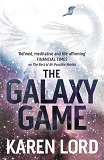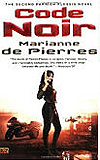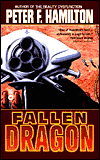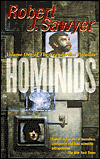
The Galaxy Game, by Karen Lord
Book Review by SJ Higbee
Have you read this book?
I picked up this book with delight from the library shelves, after hearing very good things about Lord's writing. It didn't hurt that the cover was speckled with stars, either...
the galaxy game For years, Rafi Delarus saw his family suffer under his father's unethical -- and illegal -- use of psionic power. Now the government of Cygnus Beta has Rafi under close watch, in case he has a similar talent. Rafi hates their crude attempts to analyse his brain -- but is also riddled with fear. What if they are right -- and he is his father's son after all? And how can he experiment with his powers to find out?
That's as much of the blurb as I'm willing to share, as it gets far too chatty for my liking in the ensuing paragraphs. Although, I won't deny I could have badly done with some kind of help at the outset -- what the cover didn't reveal, is that The Galaxy Game is the sequel to The Best of All Possible Worlds. And given that this is epic science fiction, spanning a hatful of worlds and inter-galactic politics, I was initially adrift in a sea of characters and allusions to places that meant nothing to me.
I'm aware that the fashion for short overviews entitled The story so far... is well and truly over -- but I have recently felt strong nostalgia for that consideration for the hapless reader, like myself, who picks up a book mid-series. Especially in this case, when I wasn't aware it was part of a series... So my firm advice is if you, too, initially find it heavy going, grit your teeth and hang in there, because if your taste runs to character-led, coming-of-age stories set in interesting, original worlds, then this one is great -- once it all starts making sense.
Ravi's third person narration is interposed by his more sophisticated, worldly-wise friend Ntenman's first person accounts which swing along with much more punch -- probably because he is, outwardly at least, far more confident. And that is the glory of Lord's writing. Nothing and no one is as it first appears. She has managed to present a society where financial obligation is only one, more minor preoccupation -- what people really need to pay attention to, is their social obligations. Everyone builds up networks, and in a society where psionic power is the norm, it is this tradeoff in obligation and patronage that Rafi has to negotiate.
This would have been an impressive feat if the book was a doorstopper affair of 500+ pages -- but it isn't. The hardcover version is 340 pages long. Neither is Lord's prose particularly choppy or noticeably high octane. She devotes the necessary description required to clearly depict her beautiful, original worlds in plenty of detail, along with the food and clothing requirements, to the extent that I wouldn't be surprised if someone hasn't already snapped up the film rights. This book is cinematically sharp and would make a marvellous film, particularly for a director who likes a world laden with subtext.
By the end, I was aware that I had read a remarkable book by an extremely talented writer. And if you enjoy reading about people who have adapted in interesting ways once we reach the stars, then don't track down The Galaxy Game -- head first for The Best of All Possible Worlds, which is what I aim to do.
SJ Higbee
the galaxy game For years, Rafi Delarus saw his family suffer under his father's unethical -- and illegal -- use of psionic power. Now the government of Cygnus Beta has Rafi under close watch, in case he has a similar talent. Rafi hates their crude attempts to analyse his brain -- but is also riddled with fear. What if they are right -- and he is his father's son after all? And how can he experiment with his powers to find out?
That's as much of the blurb as I'm willing to share, as it gets far too chatty for my liking in the ensuing paragraphs. Although, I won't deny I could have badly done with some kind of help at the outset -- what the cover didn't reveal, is that The Galaxy Game is the sequel to The Best of All Possible Worlds. And given that this is epic science fiction, spanning a hatful of worlds and inter-galactic politics, I was initially adrift in a sea of characters and allusions to places that meant nothing to me.
I'm aware that the fashion for short overviews entitled The story so far... is well and truly over -- but I have recently felt strong nostalgia for that consideration for the hapless reader, like myself, who picks up a book mid-series. Especially in this case, when I wasn't aware it was part of a series... So my firm advice is if you, too, initially find it heavy going, grit your teeth and hang in there, because if your taste runs to character-led, coming-of-age stories set in interesting, original worlds, then this one is great -- once it all starts making sense.
Ravi's third person narration is interposed by his more sophisticated, worldly-wise friend Ntenman's first person accounts which swing along with much more punch -- probably because he is, outwardly at least, far more confident. And that is the glory of Lord's writing. Nothing and no one is as it first appears. She has managed to present a society where financial obligation is only one, more minor preoccupation -- what people really need to pay attention to, is their social obligations. Everyone builds up networks, and in a society where psionic power is the norm, it is this tradeoff in obligation and patronage that Rafi has to negotiate.
This would have been an impressive feat if the book was a doorstopper affair of 500+ pages -- but it isn't. The hardcover version is 340 pages long. Neither is Lord's prose particularly choppy or noticeably high octane. She devotes the necessary description required to clearly depict her beautiful, original worlds in plenty of detail, along with the food and clothing requirements, to the extent that I wouldn't be surprised if someone hasn't already snapped up the film rights. This book is cinematically sharp and would make a marvellous film, particularly for a director who likes a world laden with subtext.
By the end, I was aware that I had read a remarkable book by an extremely talented writer. And if you enjoy reading about people who have adapted in interesting ways once we reach the stars, then don't track down The Galaxy Game -- head first for The Best of All Possible Worlds, which is what I aim to do.
SJ Higbee
|
Click here to buy The Galaxy Game, by Karen Lord on Amazon
|
The Galaxy Game, by Karen Lord on Amazon

| More Books You Might Like |
Comment on The Galaxy Game, by Karen Lord
| Comments on The Galaxy Game, by Karen Lord |
| There are no comments on this book. |




